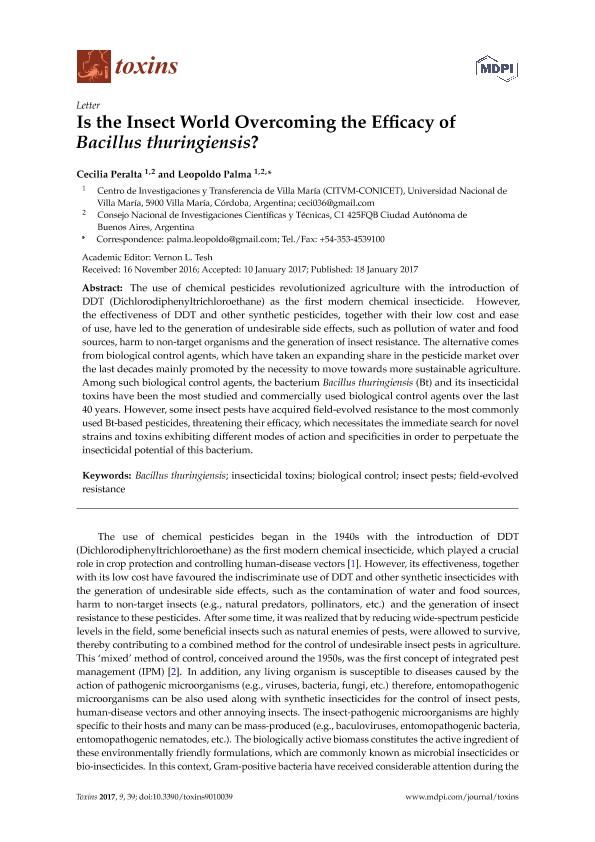Mostrar el registro sencillo del ítem
dc.contributor.author
Peralta, Cecilia

dc.contributor.author
Palma, Leopoldo

dc.date.available
2020-02-17T12:22:03Z
dc.date.issued
2017-01-18
dc.identifier.citation
Peralta, Cecilia; Palma, Leopoldo; Is the insect world overcoming the efficacy of bacillus thuringiensis?; MDPI AG; Toxins; 9; 1; 18-1-2017; 1-5
dc.identifier.issn
2072-6651
dc.identifier.uri
http://hdl.handle.net/11336/97714
dc.description.abstract
The use of chemical pesticides revolutionized agriculture with the introduction of DDT (Dichlorodiphenyltrichloroethane) as the first modern chemical insecticide. However, the effectiveness of DDT and other synthetic pesticides, together with their low cost and ease of use, have led to the generation of undesirable side effects, such as pollution of water and food sources, harm to non-target organisms and the generation of insect resistance. The alternative comes from biological control agents, which have taken an expanding share in the pesticide market over the last decades mainly promoted by the necessity to move towards more sustainable agriculture. Among such biological control agents, the bacterium Bacillus thuringiensis (Bt) and its insecticidal toxins have been the most studied and commercially used biological control agents over the last 40 years. However, some insect pests have acquired field-evolved resistance to the most commonly used Bt-based pesticides, threatening their efficacy, which necessitates the immediate search for novel strains and toxins exhibiting different modes of action and specificities in order to perpetuate the insecticidal potential of this bacterium.
dc.format
application/pdf
dc.language.iso
eng
dc.publisher
MDPI AG
dc.rights
info:eu-repo/semantics/openAccess
dc.rights.uri
https://creativecommons.org/licenses/by-nc-sa/2.5/ar/
dc.subject
BACILLUS THURINGIENSIS
dc.subject
BIOLOGICAL CONTROL
dc.subject
FIELD-EVOLVED RESISTANCE
dc.subject
INSECT PESTS
dc.subject
INSECTICIDAL TOXINS
dc.subject.classification
Biología Celular, Microbiología

dc.subject.classification
Ciencias Biológicas

dc.subject.classification
CIENCIAS NATURALES Y EXACTAS

dc.title
Is the insect world overcoming the efficacy of bacillus thuringiensis?
dc.type
info:eu-repo/semantics/article
dc.type
info:ar-repo/semantics/artículo
dc.type
info:eu-repo/semantics/publishedVersion
dc.date.updated
2020-02-12T17:51:52Z
dc.identifier.eissn
2072-6651
dc.journal.volume
9
dc.journal.number
1
dc.journal.pagination
1-5
dc.journal.pais
Suiza

dc.journal.ciudad
Basel
dc.description.fil
Fil: Peralta, Cecilia. Consejo Nacional de Investigaciones Científicas y Técnicas. Centro Científico Tecnológico Conicet - Córdoba. Centro de Investigaciones y Transferencia de Villa María. Universidad Nacional de Villa María. Centro de Investigaciones y Transferencia de Villa María; Argentina
dc.description.fil
Fil: Palma, Leopoldo. Consejo Nacional de Investigaciones Científicas y Técnicas. Centro Científico Tecnológico Conicet - Córdoba. Centro de Investigaciones y Transferencia de Villa María. Universidad Nacional de Villa María. Centro de Investigaciones y Transferencia de Villa María; Argentina
dc.journal.title
Toxins
dc.relation.alternativeid
info:eu-repo/semantics/altIdentifier/url/http://www.mdpi.com/2072-6651/9/1/39
dc.relation.alternativeid
info:eu-repo/semantics/altIdentifier/doi/http://dx.doi.org/10.3390/toxins9010039
Archivos asociados
